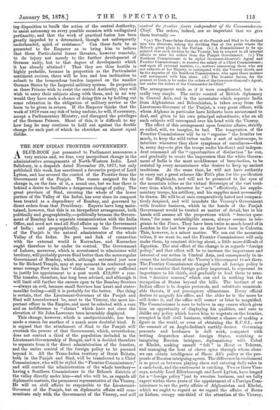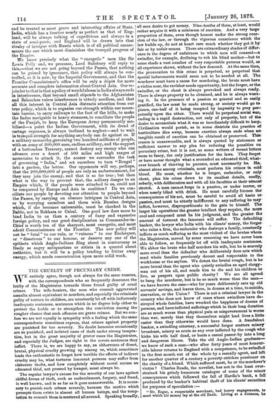THE NEW INDIAN FRONTIER GOVERNMENT.
ABLUE-BOOK just presented to Parliament announces a very serious and, we fear, very inexpedient change in the administrative arrangements of North-Western India. Lord Salisbury, in a despatch dated November 29, 1877, but only published this week, has sanctioned a favourite project of Lord Lytton, and has severed the control of the Frontier from the Government of the Punjab. The reason assigned for the change is, on the face of it, a sound one, but we fear there is behind a desire to facilitate a dangerous change of policy. The great province of Sind, covering the whole of the lower portion of the Valley of the Indus, has ever since its conquest been treated as a dependency of Bombay, and governed by direct orders from that Presidency. Experts have long main- tained, however, that this is an inexpedient arrangement, both politically and geographically,—politically because the Govern- ment of Bombay has a separate communication with the India Office, and need not send all Sind affairs up to the Government of India ; and geographically, because the Government of the Punjab is the natural administrator of the whole Valley of the Indus. Its port and link of connection with the external world is Kurrachee, and Kurrachee ought therefore to be under its control. The Government of Lahore, moreover, which is accustomed to administer wild territory, will probably govern Sind better than the more regular Government of Bombay, which, although entrusted just now to Sir Richard Temple, may at any moment be conferred upon some average Peer who has "claims" on his party sufficient to justify his appointment to a post worth £12,000 a year. The transfer, therefore, has long been advised, and although it will limit still further the careers open to the Bombay Services —always an evil, because small Services lose heart and states- manlike feeling—still it is probably for the better. One thing is certain, that the Lieutenant-Governor of the Punjab and Sind will henceforward be, next to the Viceroy, the most im- portant officer in the Empire, and must be selected with a care and an indifference to "claims" which have not since the elevation of Sir John Lawrence been invariably displayed.
This change, however, which is unobjectionable, has been made a reason for another of a much more doubtful kind. It is argued that the attachment of Sind to the Punjab will overtask the powers of that Government, which, nevertheless, does not control a third of the population included in the Lieutenant-Governorship of Bengal, and it is decided therefore to separate from it the direct administration of the frontier, and the entire control of the foreign policy to be pursued beyond it. All the Trans-Indus territory of Great Britain, both in the Punjab and Sind, will be transferred to a Chief Commissioner, who will be styled the "Frontier Commissioner," and will control the administration of the whole territory— having a Southern Commissioner in the Belooch districts of the valley directly under him—and who will be, as regards all diplomatic matters, the permanent representative of the Viceroy. He will on civil affairs be responsible to the Lieutenant- Governor of the Punjab, but on diplomatic affairs will coin- municate only with the Government of the Viceroy, and will control the frontier forces independent of the Commander-in- Chief. The orders, indeed, are so important that we give them textually :— " (a.) The Trans-Indus districts of the Punjab and Sind to be divided into two divisions, taking the dividing line at the point whore the Belooch gives place to the Pathan. (b.) A Commissioner to be ap- pointed over each division by the Viceroy, but in respect to all internal affairs to take his orders from the Punjab Government. (c.) The Northern Commissioner to be styled Governor-General's Agent and Frontier Commissioner ; to receive the salary of a Chief Commissioner; and upon all external matters, i.e., matters concerning those who are not subjects of her Majesty, to correspond with the Viceroy direot, and be the superior of the Southern Commissioner, who upon those matters will correspond with him alone. (d.) The frontier forces, for the present at least, to be under the orders of the Governor-General's Agent, not under the orders of the Commander-in-Chief."
The arrangement reads as if it were complicated, but it is really very simple. The entire control of British diplomacy in Central Asia, and in the mountains which separate India from Afghanistan and Beloochistan, is taken away from the Lieutenant-Governor of the Punjab, a very great officer, with whom Afghans in particular have hitherto been accustomed to deal, and given to his own principal subordinate, who on all such subjects will correspond over his head with the Viceroy.
The effect of this arrangement upon frontier affairs, strictly so called, will, we imagine, be bad. The temptation of the Frontier Commissioner will be to "organise " the frontier too much, to keep the wild tribes under a sort of microscope, to interfere whenever they show symptoms of unruliness—that is, every day—to give the troops under his direct and indepen- dent command all the "opportunities of distinction" he can, and gradually to create the impression that the white Govern- ment of India is the most meddlesome of busy-bodies, to be resisted by every mountaineer who desires to keep up ancient traditions. At the same time, he will not have authority to carry out a great scheme like Pitt's plan for the pacification of the Highlands, and will not be presented to the eyes of the mountain tribes as the virtual Sovereign of the vast terri- tory from which, whenever he " acts " effectively, his supple- mentary troops, his artillery, and his supplies must necessarily be drawn. He will be at once comparatively hated and compara- tively despised, and will inundate the Viceroy's Government with frontier business, which in the hands of the Punjah Government would be treated as matter of detail, but in his hands will assume all the proportions which "frontier ques- tions," for some unintelligible reason, always assume in tele- grams to the Times. They have been twice as much heard of in London in the last few years as they have been in Calcutta. This, however, is a minor matter. We can eat the mountain tribes, if we want to, and the Frontier Commissioner will only make them, by constant driving about, a little more difficult of digestion. The real effect of the change is as regards "foreign policy," and that effect will be to increase the importance and interest of our action in Central Asia, and consequently to in- crease the inclination of the Viceroy's Government to act there. The Frontier Commissioner charged with all foreign policy is sure to consider that foreign policy important, to represent its importance to his chiefs, and gradually to lead them to sanc- tion "decisive courses," which can end in nothing but the occupation of States beyond the hills. The instinct of an Indian officer is to despise protocols, and substitute unmistak- able threats, if not peremptory ultimatums. Every official desires to magnify his office, and the abler he is the more he will desire it, and the office will sooner or later be magnified. The Commissioner is sure to believe in any course which gives him an opportunity of displaying his qualities, and sure to dislike any policy which leaves him to vegetate on the frontier, occupied in dull civil business, without a chance of making a figure in the world, or even of obtaining the K.C.S.I., now the summit of an Anglo-Indian's earthly desires. Governing peasants and herdsmen is dull work, compared with writing despatches about foreign States, watching or imagining Russian intrigues, diplomatising with Cabal or Khelat, making oneself " felt " in Herat or Teheran, and managing the host of clever spies through whom alone we can obtain intelligence of Shore Ali's policy or the pro- posals of Russian intriguing agents. The difference in excitement is as great as between playing chess and entering daily sales in a cash-book, and the excitement is catching. Two or three Vice- roys, notably Lord Ellenborough and Lord Lytton, have longed for a "foreign policy "just to sweeten business, and we fully expect within three years of the appointment of a Foreign Com- missioner to see the petty affairs of Afghanistan and Khelat, which we ought to regard as we regard the affairs of Berne or Lisbon, occupy one-third of the attention of the Viceroy, and be treated as most grave and interesting affairs of State. India, which has a frontier nearly as perfect as that of Eng- land, will be always talking of expeditions and always in a state of semi-panic, and England will he drawn into that rivalry of intrigue with Russia which is of all political amuse- ments the one which most diminishes the tranquil progress of the Empire.
We know precisely what the " energetic" men like Sir Lewis Pelly and, we presume, Lord Salisbury will reply to this,—that we are not going beyond the Passes, that nothing can be gained by ignorance, that policy will always be con- trolled, as it is now, by the Imperial Government, and that the Frontier Commissioner's office will be only a d6pob for more accurate and complete information about Central Asia. Our re- joinder to that is that a policy of watchfulness in India always ends in interference, that beyond small stipends to the Afghanistan and Beloochee rulers interference is utterly needless, and that all this interest in Central Asia distracts attention from our true policy, which is to organise our strength within our moun- tain barrier, to carry railways to the foot of the hills, to make the Indus navigable to heavy steamers, to conciliate the people of the Punjab, to keep the European Army permanently mo- bilised—a point the Indian Government., with its dread of cartage expenses, is always inclined to neglect—and to wait in tranquil strength for anything anybody can do against us. If a military monarchy, governing two hundred millions of people, with an army of 200,000 men, endless artillery, and the support of a bottomless Treasury, cannot destroy any enemy who can advance over a desert of 500 miles and high ranges of mountains to attack it, the sooner we surrender the task of governing "India," and set ourselves to turn " Bengal " into a garden, the better. Our opponents will say, perhaps, that the 200,000,000 of people are only an embarrassment, for they may join the enemy, and that is so far true ; but then what is the way to prevent that, the solitary danger to an Empire which, if the people were attached to us, could not be conquered by Europe and Asia in coalition? Do we con- ciliate our people by devoting our attention to people beyond the Passes, by carrying on obscure intrigues in Central Asia, or by worrying ourselves and them with Russian designs which, if she becomes unbearable, must be checked in the Baltic, not in Bokhara or Cabal. One good law does more to bind India to us than a century of fussy and expensive foreign policy, and one good disciplinarian as Commander-in- Chief is worth ten of the sharpest, most energetic, and most adroit Commissioners of the Frontier. The new policy will not be " fatal " to our rule, or " ruinous " to our Exchequer, or " disastrous " to our honour, or deserve any one of the epithets which Anglo-Indians fling about in controversy as freely as angry antiquarians or artists in a quarrel about aosthetics, but it will be a policy tending to fritter away energy, which needs concentration upon more solid work.



































 Previous page
Previous page